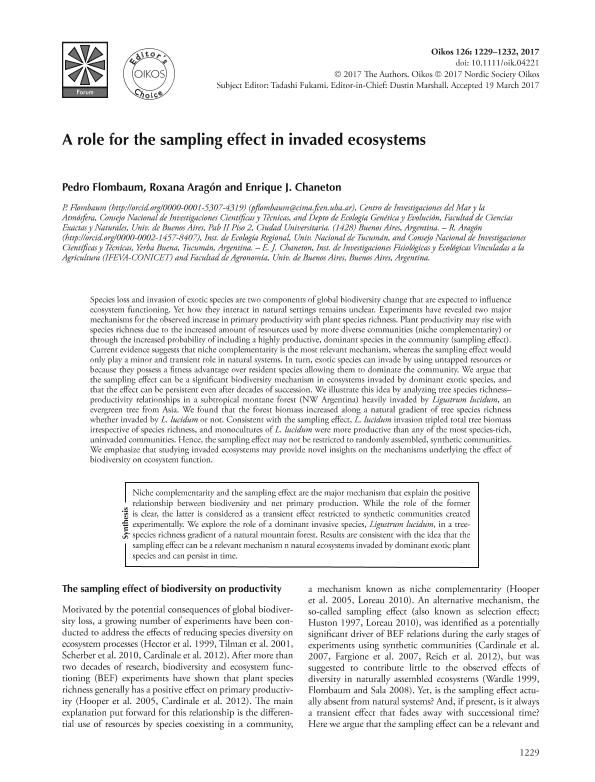Artículo
A role for the sampling effect in invaded ecosystems
Fecha de publicación:
09/2017
Editorial:
Wiley Blackwell Publishing, Inc
Revista:
Oikos
ISSN:
0030-1299
Idioma:
Inglés
Tipo de recurso:
Artículo publicado
Clasificación temática:
Resumen
Species loss and invasion of exotic species are two components of global biodiversity change that are expected to influence ecosystem functioning. Yet how they interact in natural settings remains unclear. Experiments have revealed two major mechanisms for the observed increase in primary productivity with plant species richness. Plant productivity may rise with species richness due to the increased amount of resources used by more diverse communities (niche complementarity) or through the increased probability of including a highly productive, dominant species in the community (sampling effect). Current evidence suggests that niche complementarity is the most relevant mechanism, whereas the sampling effect would only play a minor and transient role in natural systems. In turn, exotic species can invade by using untapped resources or because they possess a fitness advantage over resident species allowing them to dominate the community. We argue that the sampling effect can be a significant biodiversity mechanism in ecosystems invaded by dominant exotic species, and that the effect can be persistent even after decades of succession. We illustrate this idea by analyzing tree species richness–productivity relationships in a subtropical montane forest (NW Argentina) heavily invaded by Ligustrum lucidum, an evergreen tree from Asia. We found that the forest biomass increased along a natural gradient of tree species richness whether invaded by L. lucidum or not. Consistent with the sampling effect, L. lucidum invasion tripled total tree biomass irrespective of species richness, and monocultures of L. lucidum were more productive than any of the most species-rich, uninvaded communities. Hence, the sampling effect may not be restricted to randomly assembled, synthetic communities. We emphasize that studying invaded ecosystems may provide novel insights on the mechanisms underlying the effect of biodiversity on ecosystem function.
Palabras clave:
Diversity
,
Productivity
,
Invasion
,
Tropical Forests
Archivos asociados
Licencia
Identificadores
Colecciones
Articulos(CIMA)
Articulos de CENTRO DE INVESTIGACIONES DEL MAR Y LA ATMOSFERA
Articulos de CENTRO DE INVESTIGACIONES DEL MAR Y LA ATMOSFERA
Articulos(IFEVA)
Articulos de INST.D/INV.FISIOLOGICAS Y ECO.VINCULADAS A L/AGRIC
Articulos de INST.D/INV.FISIOLOGICAS Y ECO.VINCULADAS A L/AGRIC
Citación
Flombaum, Pedro; Aragón, Myriam Roxana; Chaneton, Enrique Jose; A role for the sampling effect in invaded ecosystems; Wiley Blackwell Publishing, Inc; Oikos; 126; 9; 9-2017; 1229-1232
Compartir
Altmétricas




